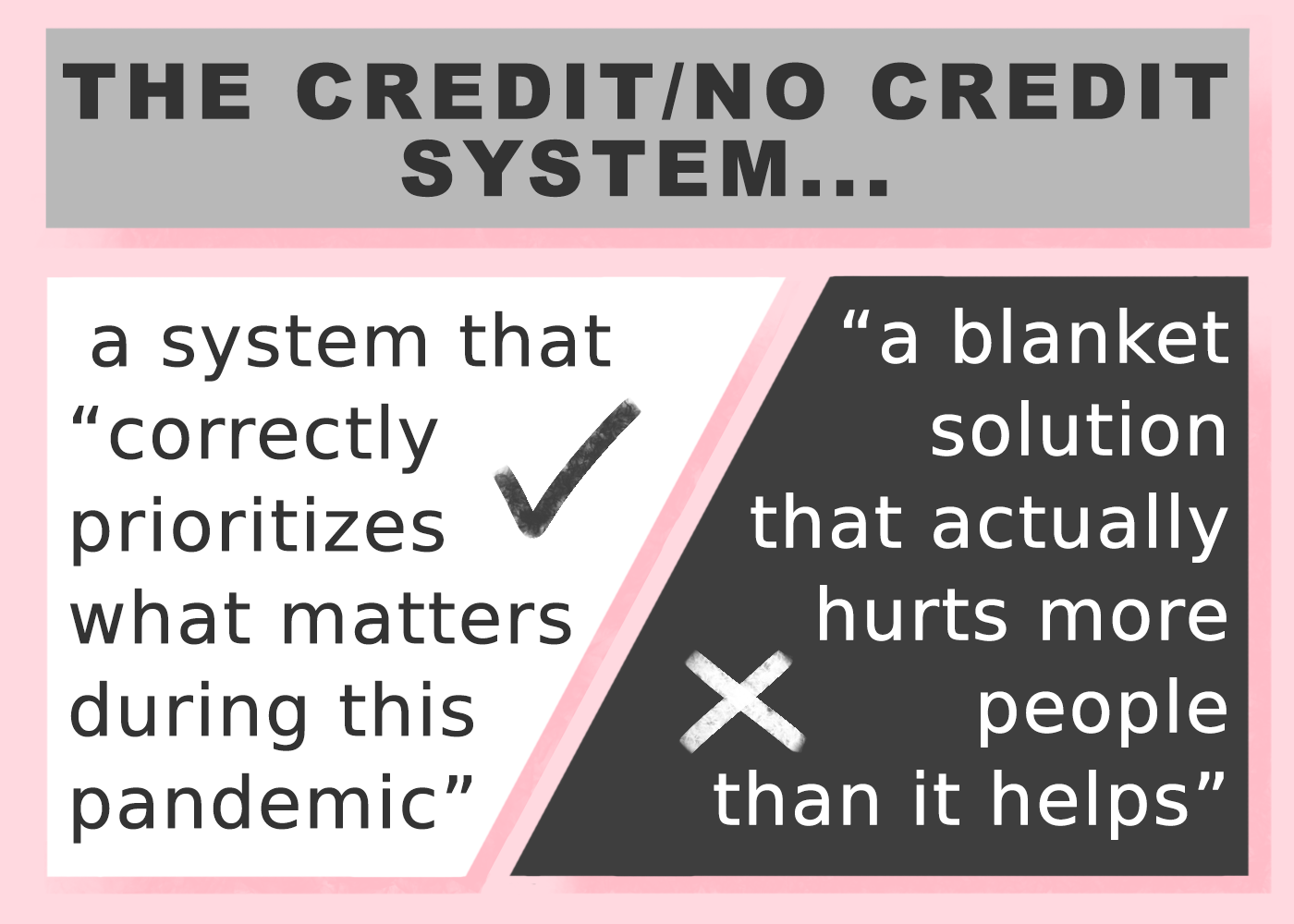Credit/no credit policy: did the MVLA School Board make the right choice?
On Monday, April 6, the Mountain View Los Altos (MVLA) School Board voted 4-1 to implement a credit/no credit grading policy. Under the credit/no credit system, students take their courses to pass or fail. On Tuesday, April 21, Principal Wynne Satterwhite announced that level of engagement, including classroom participation and attendance, would also determine if a student receives credit. Those who fail to earn credit will be enrolled in summer school to make it up.
April 25, 2020
Credit/ no credit: Not the perfect solution, but the best solution
As the Los Altos School Board Representative for the last two years, I’ve participated in various board discussions on topics ranging from stadium lights to our new bell schedule. With the current shelter-in-place and school closure caused by COVID-19, the grading policy has arguably become the most contentious discussion yet, and with good reason.
There are valid arguments for both letter grades and credit/no credit, but after hearing the various perspectives regarding the issue, I believe that the board made the correct decision in implementing a credit/no credit system for all students. In reality, any form of letter grading policy will only result in more complications than solutions, and more importantly, it implies that the district values the academic achievement of certain students over the well-being and learning of the entire community.
Letter grades are supposedly indicators of academic performance and achievement. However, the truth is that we are no longer in the classroom; online learning is by no means the same as in-class learning. Furthermore, this isn’t just any typical online learning. It’s emergency online learning. Maintaining the same practices and grading policies as before is unreasonable and does not address the needs of all the students in our community.
For instance, our teachers are not equipped with the necessary training and online platforms to effectively assess students in their classes. Students do not have the same access to the resources they might have had in a school setting. In this remote environment, it becomes extremely difficult to even gauge how well a student is performing and the causes of such performance. Letter grades, within our district and throughout the country, will lose much of the meaning they were intended to carry.
Colleges will and have recognized this. Universities including UCs, CSUs, Harvard and Stanford have already released statements saying that no student will be penalized for having credit/no credit marks on their transcript. This also implies that those with letter grades will not be rewarded. Colleges understand that there are countless factors going into transcripts this semester, so anything that appears on it will definitely not be a deciding factor in admission.
We also need to realize that we are not alone in this decision: Palo Alto, San Mateo, Santa Clara, San Jose, Campbell, Gilroy, Morgan Hill, Acalanes and San Ramon school districts have also switched to a credit/no credit system. With so many other high schools in the same boat, it won’t make a difference for letter grades to exist within a single district.
While some may argue that using third quarter letter grades will allow students’ hard work before the pandemic to be recognized, this logic also proves flawed. As previously mentioned, any sort of letter grade will have little, if any, weight at all. To believe that colleges will acknowledge a quarter grade as a representation of one’s learning throughout the entire semester will only provide false hope to students. Furthermore, if students had the choice between letter grades and credit/no credit, they would likely manipulate the grading policy so that it only benefits themselves, artificially inflating grades and further corrupting the validity behind any GPA produced during this semester.
What does matter and benefit students is how they conduct themselves despite the unfavorable conditions they may face. For those concerned about college applications, the qualitative aspects of your application (personal statement, supplemental essays, teacher recommendations, additional comments) will become increasingly important—these components will convey information about you that numbers and statistics can’t.
Rather than dedicating all your time and effort to an ambiguous letter grade, focus your attention on something that will actually have a substantial impact on your college applications. A well-written letter of recommendation attesting to your perseverance and dedication to learning or an essay describing how you used this pandemic as an opportunity to explore a passion will be infinitely more valuable than your GPA for this semester. For students primarily applying to public schools, which rely more heavily on GPA and test scores, the factors for admission will likely change accordingly to accommodate the widespread shift to credit/no credit.
Above all, credit/no credit is simply the best grading policy when it comes to equity. Continuing with letter grades prioritizes already high-achieving students, further widening the achievement gap. During these times, an A through distance learning may only be the result of one’s privilege or access to resources. Many of our students rely on the free services and assistance provided on campus, such the library and tutorial center, office hours of teachers, stable WiFi and a quiet place to work. Evaluating students by the same standards would discriminate against those who lack the opportunities typically provided in a school setting.
During such a time, our emphasis should be on learning and the health of our students, not grades. Having this debate in the first place highlights one of the flaws of our district. By focusing so much of our attention on the potential implementation of a flawed letter grade policy and figuring out how each student can maximize their GPA, we are losing sight of what’s truly important during this time: learning (both academically and personally) and maintaining the health of the entire community.
With so much uncertainty in our community, we need to focus on what’s most essential. The goal of the district is to educate, and education is about learning, not grades. While grades do play a significant role in learning, it should not form the foundation. In fact, I find it concerning when students no longer see the value in learning if they aren’t rewarded with a letter grade. Letter grades have their benefits, but for this semester, they simply shouldn’t be a priority.
After reading almost all of the comments on the Change.org petition and “Mountain View Voice” articles, I was disheartened by the reasoning behind some community members’ opinions. Personally, I don’t care about the numbers of the survey sent to the community or whether there are small solutions to the infinite complications of a letter grade policy. To think that one’s difficulties getting into a competitive college are more important than the struggles of some members of our community is selfish and ignorant. Valuing college applications during this time is understandable, and there are countless ways to improve your chances aside from grades. However, expecting the district to shift their focus away from students with more pressing issues so that others can get individual recognition through a letter grade demonstrates a lack of empathy and awareness.
As a community, we need to look at the larger picture. We are in a global pandemic, and no, we can’t just return to normal. We have been forced to reassess what’s most valuable to us, not only on an individual scale but at a district level as well. With the virus disproportionately affecting certain members of our community, maintaining letter grades at this time would send the message that we value the academic achievement of some students over the wellbeing of the community as a whole. By switching to a blanket credit/no credit system, our district correctly prioritizes what matters during this pandemic: our learning and our health.
Credit/no credit grading policy misses the mark
Within a week, a petition against the school board’s decision gained over 1,000 signatures. I signed and posted a vehement comment, angry with the board for “reducing the hours of effort we put in to waste.”
However, I retracted my signature when I realized a better alternative: Keeping third quarter letter grades that cannot be lowered, but having students choose whether they want their final semester grade to affect their GPA.
Academic Growth
The credit/no credit policy discredits the work students have put forth this semester and disincentivizes them from learning.
This semester feels like a waste of time for students who have put significant effort toward improving their grades to demonstrate a pattern of academic growth throughout high school, especially for juniors. Many are currently stressed that their last opportunity to raise their GPA is gone. Students like junior Annika Gaglani want to keep letter grades, and for sensible reasons.
“A lot of people were counting on [letter grades] to show that they’ve been working hard,” Annika said. “Colleges receive thousands of applicants every year, and they just don’t have time to read into all this extra information [about upward grade trends].”
While some are stressed, others are unmotivated by the new grading system. Let’s be honest: learning and grades are intertwined. We learn for a grade, so when grades are dropped, students are disincentivized to learn.
This is why having third quarter grades that can only be improved acts as a stimulus for students to continue learning new content. Although some may argue that students who already have an A in their class for third quarter will not be academically motivated, A-level students are typically diligent and ambitious. With the credit/no credit system, there will be significant variation in the quality of work submitted because a C becomes the same as an A.
Equity
The petition mentioned earlier advocates for students to receive letter grades that can only be improved during the fourth quarter, but its proposition should be taken with a grain of salt.
This proposal may be better for some, but it leaves an important group of students in the dust. We criticize the notion that semester grades should impact everyone’s GPA, as students who lack necessities during this time of crisis are not on the same playing field as their peers.
Low income students dissatisfied with their third quarter grades lack the resources they would have if school was still in session: office hours, tutorial services and test retakes. They have less opportunities to maintain and improve their grades, as some have to work to support their families or take care of their siblings.
The optional GPA inclusion accommodates them, as their inability to focus on their grades may lead to lower second semester GPAs. This would negatively impact their academic opportunities in high school, including qualifying for the National Honors Society, which requires an unweighted 3.65 GPA, and sports.
Therefore, the preferred solution would be to give everyone a letter grade on their transcript, which will accurately reflect their performance across the whole semester, and optional GPAs to accommodate students unable to focus on their grades.
Majority
The policy we propose isn’t perfect, but it appears to be what the majority wants.
Before the MVLA School Board made a final decision, they distributed a survey about grades and senior activities. Keeping third quarter grades that can only be raised was a suggested option in the survey.
Despite several requests from The Talon, these survey results were never published. This is troubling, especially when many respondents were under the impression that the survey results would impact the school board’s decision.
“I recognize that people have these difficult situations right now, but I still think that the board should have made the decision that goes along with the majority and the greater good and then personally see to it that the minority doesn’t fall behind,” Annika said.
However, even if we don’t have these results, the 1,452 signatures on the petition prove that this decision wasn’t made to satisfy the majority. MVLA parent Nancy Bremeau was one of many to sign and comment on this petition.
“[The rule should] make sense for the majority and make exceptions for the few, not the other way around,” Bremeau said.
Obviously, this sentiment is shared by many who are against the school board’s decision. We should pick the option that benefits the greatest number of people, all with different wants and needs during this time.
For a school that preaches equity, it’s disappointing to get a grading system that doesn’t meet each student’s needs. Different solutions work for different people, and we shouldn’t put forth a blanket solution that actually hurts more people than it helps.





Divya Jakatdar | Apr 25, 2020 at 8:36 pm
Oliver has wonderfully articulated the truth. To want to remain most competitive and allow transcripts to imply a student is less qualified because they chose not to show their GPA is to be blissfully unaware.